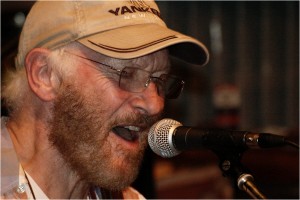Tony Sheridan (Anthony Esmond Sheridan McGinnity; 21 May 1940 – 16 February 2013) was an English rock and roll singer-songwriter and guitarist. He was best known as an early collaborator of the Beatles (though the record was labelled as being with “The Beat Brothers”), one of two non-Beatles (the other being Billy Preston) to receive label performance credit on a record with the group, and the only non-Beatle to appear as lead singer on a Beatles recording which charted as a single.
Sheridan was born in Norwich, Norfolk, where he grew up at 2 Hansell Road in Thorpe St Andrew and attended the City of Norwich School.
In his early life, Sheridan was influenced by his parents’ interest in classical music, and by age seven, he had learned to play the violin. He eventually came to play guitar, and in 1956, formed his first band. He showed enough talent that he soon found himself playing in London’s “Two I’s” club for some six months straight. In 1958, aged 18, he began appearing on Oh Boy, made by the ITV contractor ABC, playing electric guitar on such early rock classics as “Blue Suede Shoes”, “Glad All Over”, “Mighty Mighty Man” and “Oh Boy!”. He was soon employed backing a number of singers, reportedly including Gene Vincent and Conway Twitty while they were in England. In 1958 Johnny Foster sought to recruit Sheridan as a guitar player in Cliff Richard‘s backing band (soon renamed the Shadows), but after failing to find him at the 2i’s Coffee Bar opted for another guitarist who was there, Hank Marvin. Early in 1960, he performed in a tour of the UK, along with Vincent and Eddie Cochran. On 16 April, Vincent and Cochran rebuffed his request to ride along with them to the next venue, but he thereby escaped the road accident which would leave Cochran dead and Vincent badly injured.
Sheridan played guitar for Cherry Wainer on her recording of “Happy Organ”. Despite these successes, his penchant for being late, showing up without his guitar, etc., soon got him a reputation for having gone a bit “haywire”, and cost him much of his professional standing in England. Providentially, an offer for a gig came from Bruno Koschmider’s “Kaiserkeller” club in Hamburg, Germany for an English group to play there. Sheridan and others (including Colin “Melander” Crawley) joined an ad hoc group promptly dubbed “The Jets” and were put on the ship headed for Hamburg. As fate would have it, legal woes (i.e. lack of proper papers) caused “The Jets” to not last long, but Sheridan (and now-friend Colin “Melander” Crawley) were soon back onstage in Hamburg.
While performing in Hamburg between 1960 and 1963, Sheridan employed various backup bands, most of which were really “pickup bands”, or simply an amalgam of various musicians, rather than a group proper (though almost always including now bassist Colin “Melander” Crawley). However, in 1961, the young Beatles (with their line-up at the time of John Lennon, Paul McCartney, George Harrison, and Pete Best) who had met and admired Sheridan during their first visit to Hamburg in 1960, and who openly worked with him on their second visit, became even closer. The Beatles sometimes backed Sheridan, who, in turn, often joined the Beatles during their own sets backing them on guitar. They even visited Sheridan’s home and had jamming sessions in the back garden
When German Polydor producer/A and R man Bert Kaempfert saw the pairing on stage, he suggested that Sheridan and the Beatles make some recordings together. Kaempfert viewed Sheridan as the one with “star” potential, and though they signed the Beatles to play on Sheridan’s records their contract with them stipulated that the four Beatles (Lennon, McCartney, Harrison and Best) were insured to play on a minimum of two songs. Of the seven songs recorded during Sheridan’s two-day-long sessions for Polydor in June 1961, it should be pointed out that at times the band behind Sheridan would be down to only two Beatles, and that conversely only on their two solo songs do all four Beatles play (minus Sheridan), while Sheridan plays on all of his tracks. John Lennon’s rhythm guitar is heard only on the two Beatle solo tracks (though his voice is heard in background vocals on Sheridan’s tracks).[citation needed] These sessions produced Sheridan’s “My Bonnie” and “The Saints“, and the Beatles’ “Ain’t She Sweet” and “Cry for a Shadow” (formerly titled “Beatle Bop”), plus three other songs. Polydor’s beliefs in Sheridan’s coming stardom were so strong that they buried the two solo Beatle tracks until much later. Both John Lennon and Tony Sheridan swore that there were several other Beatle tracks that were recorded during the two-day session, but they have not resurfaced.
Visit site: https://en.wikipedia.org/wiki/Tony_Sheridan



